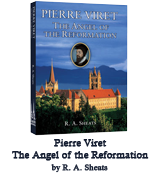Why Study Viret?
VIRET WAS AN EMINENT THEOLOGIAN:
It is important also not to confine the French Reformation to a single person such as John Calvin and his Institution of the Christian Religion, as magnificent as the latter is and will continue to be. As an example already the first tome of [Viret’s Christian Instruction] provides some interesting details contrasting with the Catechism of Geneva as well as the Institutes. More original still, in the following tome, you will find practical in depth explanations of the Ten Commandments of the Law of God and, even more striking, in subsequent tomes, extraordinary pages on the sciences, animals, and human body. In short, an exposition of the "book of nature," that would inspire La Semaine ou Création du monde [The Week or Creation of the World] by Salluste du Bartas (1544-1590), which itself would enjoy a lasting success in the Protestant countries. To my knowledge, there is nothing comparable in the writings of Calvin. The practical concerns of Viret explain his concern for ethics, apologetics and pedagogy. Proof is his turning to Dialogue, placing the religious discourse in everyday life in order to make it more realistic. If Calvin is considered as a master of the religious treatise—and with what talent!—Viret is a master of theological Dialogue—and with what brilliance!1
There is no "Rue Pierre Viret" in Geneva. Viret does not stand next to John Calvin, Guillaume Farel, Theodore Beza, and John Knox in Geneva’s Reformation Monument, but one suspects that had a fifth figure been added, it would have been Viret. Pierre Viret (1511-1571) is best known as the reformer of Lausanne, where he served from 1536 to 1559 during the crucial, formative years of the Reformation in his native Pays de Vaud. His ministry in Lausanne was bracketed and occasionally interrupted, however, by stays in Geneva. Viret’s activity in Geneva, together with his close personal relationship with John Calvin, made him in some ways a minister of Geneva his entire adult life. Indeed, the Reformation in Geneva would not have taken the form that we know it without him.2
PIERRE VIRET EXCELS IN HIS UNDERSTANDING OF BIBLICAL LAW, ETHICS, APOLOGETICS, AND POLITICAL THEORY. HE IS REGARDED BY MANY AS THE GREATEST 16TH CENTURY SCHOLAR IN THESE FIELDS.
VIRET’S MAGNUM OPUS ‘CHRISTIAN INSTRUCTION’ IS ON PAR WITH CALVIN’S INSTITUTES:
If his good friend, John Calvin, was the consummate dogmatician and the prince of exegetes, Pierre Viret must be considered as the finest ethicist and the most acute apologist of the Sixteenth Century. His monumental Instruction chrétienne en la doctrine de la Loy et de l’Evangile et en la vraie philosophie et théologie, tant naturelle que supernaturelle des chrétiens [Christian Instruction in the Doctrine of the Law and the Gospel and in true Christian Philosophy and Theology, both Natural and Supernatural] is without doubt his major theological work and can well bear comparison, in its own domain, with Calvin’s Institutes.3
On the timelessness of Viret’s ‘Christian Instruction,’ Pierre Courthial writes:
The dramatic spiritual and theological deviation of "Protestantism," in reference to the divine Norm, which should sovereignly govern the Church, and which was the empowering motivation behind the Reformation in the 16th and 17th centuries, is such today that we should receive with gratefulness all that, here and there, brings to remembrance, underlines the true sense, and contributes to the progress of the ecclesial catholic faith. Therefore, we should be profoundly joyful about the publication (unexpected and extraordinary after more than four centuries!) of one of the magisterial works of the Reformation, Christian Instruction by Pierre Viret.4
VIRET’S CHRISTIAN INSTRUCTION IS THE BEST COMMENTARY ON THE TEN COMMANDMENTS THAT THE CHRISTIAN CHURCH HAS EVER KNOWN
But if Calvin is incomparable as a dogmatic exegete and polemist, Viret largely surpasses him as ethicist and apologist. His strength was a domain often neglected, because of its awkwardness: the application of the Word of God to all domains of life. His Christian Instruction in the Doctrine of the Law and Gospel of 1564 is unquestionably the best commentary on the Ten Commandments that the Christian Church has ever known. In this work, as he presents the appearance of the philosophical idealism of Descartes (a subjectivism that does not allow any true link between the knowledge of nature and that of the Creator, Romans 1:18-23), Viret gives us a magisterial application of the Biblical doctrine of the general revelation of God throughout all creation. His marvelous polemical dialogue, Le Monde à l’Empire et le Monde Démoniacle (1561) contains—among other treasures—a historical, social, and economic analysis of the light of the Word of God which permits him, for example, to put his finger on the functioning of certain economic phenomena perverted in his time, two centuries before the development of modern economic science! As a Christian moralist he was comparable to a John Chrysostom of the fifth century, to a Cardinal Pie of the nineteenth, or even to a Rousas Rushdoony of our epoch. It is high time that we finally begin to grasp the importance of this remarkable thinker, that we repeat his words in modern adaptation, and that we return to his vision of the application of the complete Word of God to all aspects of human life, to all scientific disciplines. Without such a return to the Biblical reality we can have no hope for the revival of the Church and for the restoration of his reformational influence over the entirety of culture and society.5
ABRAHAM RUCHAT: “VIRET’S WORKS HAVE NO EQUAL IN FRENCH SWITZERLAND.”
One notices here a vast scholarship, a surprising literature, an exact knowledge of all sacred and secular antiquity, Greek and Latin, containing the most beautiful, and the most curious, a profound knowledge of the Bible and theology. He was a person in French-speaking Switzerland of whom there was no equal, and if his works began to be reprinted, they would be read with fruit and pleasure by all learned people, and all those of good taste.6
VIRET’S WORKS ARE RELEVANT AND CRITICAL TO OUR MODERN TIMES:
Like the apostle Paul, Viret makes himself all to all, interests himself in every aspect of contemporary life in order to win at least some of his contemporaries to the Gospel of Jesus Christ. The appropriation of the various aspects of this apologetic method could bring a very useful corrective to the pragmatism of a rationalistic defense of Christianity current in many Evangelical circles and to the theological and philosophical abstractionism of much, even of the best, present reformed apologetics.7
PIERRE VIRET SURPASSES HIS CONTEMPORARIES IN HIS UNDERSTANDING OF BIBLICAL LAW, ETHICS, APOLOGETICS, AND POLITICAL THEORY. HE IS REGARDED BY MANY AS THE GREATEST 16TH CENTURY SCHOLAR IN THESE FIELDS
VIRET LED THE REFORMATION IN FRENCH SWITZERLAND:
Calvin was present [at the Lausanne Disputation of 1536] and spoke briefly on several occasions but it was Farel and Viret who carried the chief burden of the argument for the Reformed cause. Worth noting was the fact that Viret’s careful and skillful handling of the question of the relation of the civil magistracy to the true Church of God was seconded by both Calvin and Farel. In fact, after the first two days [of the Disputation] it was Viret who spoke most often and for the greatest length of time, and it was he who finally won the day for the Reformed faith. . . . There was a marked increase in the number of adherents to the Reformation including a number of converts from the ranks of the Roman Catholic clergy present at the debate. During the disputation and the three months following more than eighty monks and nuns and over one hundred and twenty members of the secular clergy of the Roman Catholic Church were won over to the Reformed faith, the majority of them due to the efforts of Viret.8
Back to top of page



